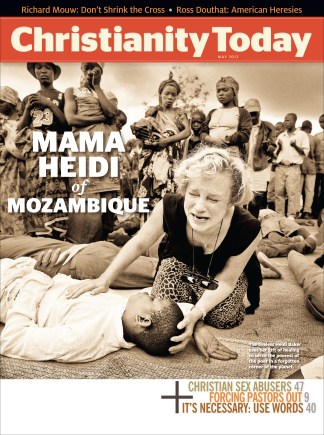Five years ago, Féliz Talibo, a farmer in rural Mozambique, was a very faithful Muslim, regularly praying in the mosque. He was also chronically sick, subject to fainting and seizures.
Desperate for a cure, Talibo turned to the village witch doctor, who provided fetishes and charms for healing—and required hefty payment for his services. But Talibo’s seizures persisted.
On a Friday night in December 2007, Talibo fell into a deep sleep. A man in white visited him in a dream and said, “When you want to be healed, you have to go to the church. This sickness will go away.”
Two days later, Talibo walked two miles to the nearest church. He met the pastor and told his story. The pastor said, “This is an evil spirit. Come to church. We will pray for you. Tomorrow, we will come to your house and take out all the witchcraft.” At first, Talibo accused the pastor of lying. But he attended the service and received prayers for healing. The next day, church members came to Talibo’s home, removed all the witchcraft paraphernalia, and burned it.
The church, its pastor, and its elders are the result of the remarkable ministry of Heidi and Rolland Baker, whose Iris Ministries is profiled in this issue’s cover story by senior writer Tim Stafford, with photographs by design director Gary Gnidovic.
The Bakers have served overseas as a couple since 1980. Their work in Mozambique began in 1995 with care for orphans and abandoned children. Soon, they began planting so-called bush churches in remote villages. They also began training pastors. Today, there are an estimated 10,000 of these congregations. Hundreds of church leaders receive Bible training each year at an Iris school.
Heidi Baker is known worldwide for miracles of healing. But the miracle of Heidi Baker is so much more than the healing. Known for her watchwords, “Love looks like something” and “Stop for the one,” Heidi’s life embodies her message in a way that is authentic and life-changing. It points people like Féliz Talibo to the Cross of Christ.
Talibo was healed in 2007. He has had no seizures since that fateful Sunday. He came to realize that it was Jesus who appeared in his dream. Talibo learned to read the Bible, and the pastor allowed him to share his testimony. Over time, Talibo grew in his ability to lead. Eventually, the pastor selected Talibo to start a new bush church in his home village, a largely Islamic area. One of the first things Talibo did in his new church? He took two orphans into his own household.
Next month: Thomas Bergler: How youth ministry “juvenilized” the church; Tim Stafford: What makes a miracle a miracle; Jeremy Weber: Egyptian Christians fight for the future.
Related Elsewhere:
Check out “Miracles in Mozambique,” this month’s cover story on Heidi and Rolland Baker and accompanying photo slideshow from design director Gary Gnidovic’s trip to Mozambique.
The May issue is now available. (Some articles may require a subscription.)
Previous CT coverage of Mozambique includes:
A Hand Up: Aid for Trade in Mozambique | Faith-based model teaches rural poor how to use trade to rise out of poverty. (July 8, 2012)
Surprised by Friendship | Discovering where hope begins in a village in Mozambique. (January 11, 2007)









